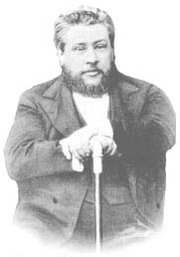 Charles Spurgeon was by far the most influential Christian preacher of the last 200 years. And today, Christians of all sorts pay attention to what he thought and said on any given topic. Given the nearly unparalleled length of his written works (almost every sermon recorded for us), and given the length of his ministry, one is apt to find Spurgeon statements that can be construed to support both sides of any given debate!
Charles Spurgeon was by far the most influential Christian preacher of the last 200 years. And today, Christians of all sorts pay attention to what he thought and said on any given topic. Given the nearly unparalleled length of his written works (almost every sermon recorded for us), and given the length of his ministry, one is apt to find Spurgeon statements that can be construed to support both sides of any given debate!
Wine, it seems is no exception. Among fundamentalist and conservative evangelicals, the prohibitionist movement is alive and well. Many claim not only that abstaining from wine and alcohol is the wisest course of action, but some even claim the Bible only supports a strictly tee-totaler’s view on the subject.
Spurgeon converted to the prohibitionist cause, but apparently never held that wine in Bible times was not fermented–at least the wine Jesus drank.
Doug Kutilek, at Sharper Iron, shared some interesting quotes on this topic recently. Here is an excerpt from the early Spurgeon (1877):
“˜UNFERMENTED wine’ is a non-existent liquid. Mr. Wilson [in his book The Wines of the Bible: an Examination and Refutation of the Unfermented Wine Theory, by A.M. Wilson (Hamilton, Adams & Co.)] has so fully proved this that it will require considerable hardihood to attempt a reply. The best of it is that he is a teetotalert of more than thirty years’ standing, and has reluctantly been driven “˜to conclude that, so far as the wines of the ancients are concerned, unfermented wine is a myth.’ While total abstainers are content to make no assault upon the cup used at the Lord’s table, they work harmoniously with all who seek the welfare of their fellow men; but when they commence warfare upon that point they usually become more factious than useful: everything is then made subordinate to their one idea, and the peace of the church is disregarded. [Read the whole quote at Sharper Iron]
 10 years earlier (1857), Spurgeon had said:
10 years earlier (1857), Spurgeon had said:
I am no total abstainer. I do not think the cure of England’s drunkenness will come from that quarter. (Pg. 380, Spurgeon: Prince of Preachers, Lewis Drummond)
By 1887, however, Spurgeon had donned the blue ribbon of the Temperance Movement. It was not just his position change which could cause confusion, but even as an abstainer he acknowledged both sides of the issue, to some extent.
In the book Charles Spurgeon: Prince of Preachers, by Lewis Drummond (Kregel, Grand Rapids: 1992) one finds the following contradictory quotes from Spurgeon from his later years:
“I don’t need it for myself, but if it will strengthen and encourage a single soul among the 5,000 that are here, I will put it [a blue ribbon] on.”
“Next to the preaching of the Gospel, the most necessary thing to be done in England is to induce our people to become abstainers.” (Both quotes, pg. 440, Spurgeon: Prince of Preachers, Lewis Drummond)
So there you have it. Next time you are debating this topic, cite Spurgeon for support. No matter what side you’re advocating!
For further resources on the alcohol debate, check out my previous articles on wine:
Pictures borrowed from Wikipedia articles on Charles Spurgeon and Wine.
Like this:
Like Loading...


 10 years earlier (1857), Spurgeon had said:
10 years earlier (1857), Spurgeon had said: I’m sure my astute readers are all up to speed on the open theism debate. Then again, some of you probably aren’t. And I haven’t really ever debated the issue, so I had to do some homework too.
I’m sure my astute readers are all up to speed on the open theism debate. Then again, some of you probably aren’t. And I haven’t really ever debated the issue, so I had to do some homework too. A quick update here.
A quick update here.